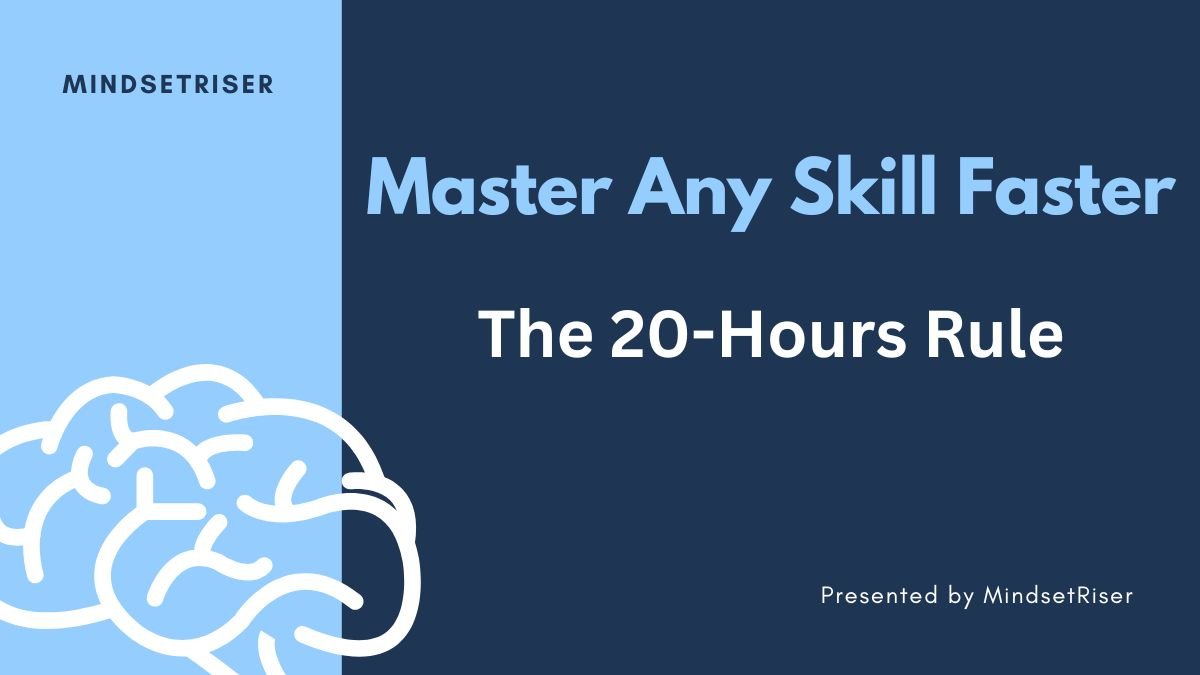How to Master Any Skill Faster (The 20-Hour Rule)
The 20-Hour Rule: How to Master Any Skill Faster
Mastering a new skill can feel overwhelming, especially when we believe it takes 10,000 hours to become an expert. But what if you didn’t have to spend years to be proficient? What if you could learn a new skill and be good enough in just 20 hours? That’s the power of the 20-Hour Rule, popularized by Josh Kaufman.
The idea behind the rule is simple: with focused, deliberate practice, anyone can master the basics of a new skill in just 20 hours. It’s not about becoming an expert, but about getting to the point where you can see progress and feel competent in your new ability.
Let’s dive into how you can apply this rule to master any skill faster.
Why 10,000 Hours is a Myth
Many people have heard the 10,000-hour rule made famous by Malcolm Gladwell’s book Outliers, which claims it takes 10,000 hours to become world-class in any field. While the rule holds true for experts like athletes or musicians who strive for mastery, it’s not necessary for learning a new skill.
For most people, 10,000 hours is overkill. If your goal is simply to become proficient in a skill—like learning a new language, picking up a musical instrument, or even improving your public speaking—the 20-Hour Rule is the better approach.
You don’t need to dedicate years to becoming skilled. In fact, research shows that deliberate practice can improve performance in a matter of weeks, not decades.
The Importance of Practice Over Time
The goal is to focus on the right kind of practice. A skilled practitioner doesn’t need to practice for hours on end without purpose. Instead, it’s the intensity and quality of your practice that matter most. By following a structured plan, even a small amount of focused practice can lead to significant progress.
How to Learn Any Skill in 20 Hours
Now that we’ve debunked the 10,000-hour myth, let’s look at how to apply the 20-Hour Rule. The key to mastering any skill in this short amount of time is to focus on deliberate, structured practice. Here’s how you can maximize your learning:
1. Choose One Skill and Be Specific
The first step to mastering any skill quickly is to pick one specific skill to focus on. While it’s tempting to want to learn everything, trying to learn too much at once will only lead to burnout.
- Pick a skill that excites you—something that you are genuinely passionate about. Whether it’s learning to play an instrument, speak a new language, or pick up coding, choosing something that excites you will keep you motivated throughout the process.
- Set a clear goal—Instead of a vague “I want to learn to play the guitar,” aim for something more tangible. For instance, “I want to learn to play three simple songs on the guitar.” This way, you have a clear target to measure your progress.
2. Break the Skill into Sub-Skills
Mastering any skill often means tackling its components. If you’re learning to play guitar, you don’t need to start by learning advanced solos right away. Instead, break the skill down into smaller, manageable sub-skills.
- Identify the core components of the skill—What are the building blocks that will give you the best results fast?
- If you’re learning a language, prioritize the most common words and phrases used in everyday conversation.
- If you’re learning to cook, focus on mastering 5 basic techniques rather than attempting complex recipes right off the bat.
By focusing on what matters most, you’ll be able to see results faster and avoid feeling overwhelmed.
3. Set a 20-Hour Commitment
The next step is to make a firm commitment to practice. 20 hours sounds manageable, but to see real results, you need to commit to consistent practice.
- Commit to 45 minutes per day for a month. This is an amount of time that’s short enough to keep you motivated but long enough to see significant improvement.
- Make your practice time focused and distraction-free. Turn off your phone, avoid multitasking, and give yourself 100% to your learning.
- Consistency is key—it’s better to practice a little every day than to cram all 20 hours into one weekend.
4. Remove Barriers to Practice
One of the most common reasons people fail to learn new skills is because they let obstacles get in their way. But if you set yourself up for success, you’ll find it easier to stay committed.
- Prepare everything you need before you start practicing. This might include gathering tools or materials for your new skill—whether it’s a guitar, coding software, or a foreign language app.
- Eliminate distractions—create a space where you can practice without interruptions.
- Simplify your process—avoid overwhelming yourself with too many complex steps. Focus on the essentials and work on mastering them first.
5. Get Immediate Feedback
To improve quickly, you need to get feedback. This will help you correct mistakes and refine your technique as you go along.
- Record your practice—This can be as simple as recording yourself speaking a new language or playing an instrument.
- Ask for feedback—If you know someone experienced, ask them to critique your performance.
- Analyze your mistakes—Rather than feeling discouraged, view your mistakes as an opportunity to improve. Feedback helps you learn faster by making your practice more efficient.
6. Focus on Repetition and Consistency
To truly master a skill, you need to practice it consistently. Repetition allows you to internalize new knowledge, improving your proficiency in the long run.
- Practice daily—Even 20-30 minutes a day will help you improve significantly.
- Don’t skip practice—Skipping sessions will slow down your progress and make it harder to stay committed.
- Track your progress—Monitor how you’re improving to stay motivated. This can help you see how far you’ve come and keep your momentum going.
7. Embrace Discomfort and Push Through
One of the hardest aspects of learning is dealing with the frustration that comes with the early stages. When you’re learning something new, it’s normal to struggle. But pushing through this discomfort is where real progress happens.
- Expect frustration—The first few hours will be difficult, but stick with it.
- Push through the frustration barrier—Many people give up when they start feeling frustrated. Don’t quit—this is when your skills start to develop.
- Don’t expect perfection—Instead of trying to get everything right, aim to make consistent improvements over time.
Examples of Skills You Can Learn in 20 Hours
Now that you know how to apply the 20-Hour Rule, here are a few examples of skills that you can learn in just 20 hours:
- Playing an Instrument – Learn the basics, like chords and simple songs.
- Speaking a New Language – Focus on conversational phrases to hold basic conversations.
- Coding – Learn how to build a simple website or automate a basic task.
- Public Speaking – Develop confidence and fluency in delivering short speeches.
- Photography – Understand camera settings and basic composition.
- Speed Reading – Increase your reading speed and comprehension.
- Drawing – Practice basic sketching techniques.
- Cooking – Master essential cooking techniques and create simple dishes.
Real-Life Success Stories
Josh Kaufman – Learning to Play the Ukulele in 20 Hours
Josh Kaufman, the creator of the 20-Hour Rule, demonstrated how he learned to play the ukulele from scratch in just a few weeks by applying the principles of deliberate practice. He recorded his progress, focused on mastering basic chords, and played simple songs within just 20 hours of practice.
Tim Ferriss – Accelerating Language Learning
Tim Ferriss, the author of The 4-Hour Workweek, is known for his ability to learn new languages quickly. Using targeted learning methods, Ferriss has mastered languages like Spanish, Portuguese, and Mandarin in record time—often within just a few weeks.
Elon Musk – Learning Rocket Science on His Own
Elon Musk didn’t study aerospace engineering in school, but when he wanted to create SpaceX, he taught himself the fundamentals of rocket science by reading textbooks and breaking the subject into manageable chunks. He focused on the core principles of physics and engineering to learn quickly and efficiently.
Final Thoughts: Start Today!
Mastering a new skill doesn’t have to take years. By following the 20-Hour Rule, you can gain proficiency in just a few weeks. Whether it’s learning a new instrument, picking up a foreign language, or enhancing your professional skills, 20 hours of focused practice is all it takes to become good enough to see real progress.
What You Can Do Now:
✔ Pick a skill you’ve always wanted to learn.
✔ Set up a 20-hour learning plan.
✔ Commit to consistent daily practice.
✔ Track your progress and push past frustration.
In just 20 hours, you could be playing an instrument, speaking a new language, or mastering a new craft. The key is starting today!

